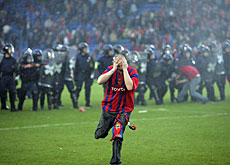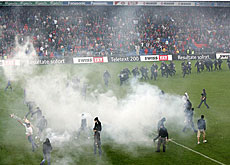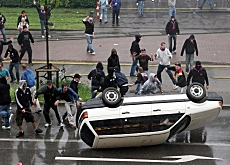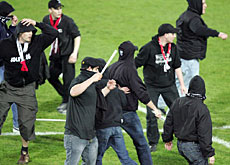English model could beat football hooligans

Swiss football clubs should forge a pact with fans to free the game from the steadily spreading stain of hooliganism, a British expert tells swissinfo.
John Williams, a sociologist at Leicester University, believes clubs must shoulder more responsibility for fans’ behaviour rather than leave it to the police.
Football hooliganism became known around Europe as the “English disease” as violence escalated in England from the 1960s to the 1980s, ultimately leading to several deaths at matches.
Williams thinks English police and the game’s authorities took the wrong approach at first by caging in fans at grounds, but they later learned how to deal with the problem with a combination of improved facilities and tough legislation.
swissinfo: What is the best solution to the problem of hooliganism?
John Williams: The mistake we made in England at first was to segregate fans and barricade them into the stands. This gave hooligans their own space which they could control and which strengthened their feeling of collective solidarity. It would be dangerous for Switzerland to go down that easy route.
In the 1990s English stadiums became all seating and clubs were told to take more responsibility for the management of the crowd.
Clubs made a social contract with their fans that they would no longer cage them in like animals, so they were expected not to behave like animals.
swissinfo: Does legislation such as banning hooligans from grounds, collecting intelligence on troublemakers, and increasing powers of detention work?
J.W.: The pincer movement of more sophisticated policing combined with tougher legislation has made it very difficult for hooligans to operate in English grounds. It is now a criminal offence to run onto a pitch and banning orders have been very effective.
Hooligans now contact each other to arrange clashes away from the grounds because it is too dull for them at stadiums.
It may not be appropriate to bring in all these measures into Switzerland but it would be better than making policing more heavy and building fences.
swissinfo: How do you tell the difference between spontaneous acts of violence and organised hooliganism?
J.W.: The first sign is seeing groups of identifiable young guys who are usually present when there is trouble.
Once seemingly spontaneous hooliganism becomes a regular feature then this is a sign that it is becoming organised. The troublemakers can sense when the crowd is reaching boiling point and initiate violence, often dragging people in who would not normally get involved.
swissinfo: What makes fans turn into hooligans?
J.W.: Each country has its own history. In England the problem began to grow in the late 1950s tied in with youth culture initially. Young fans became isolated from the older fans and the football ground became a testing ground for young working class masculinity.
This attracted guys who were actually not interested in football and hooligans began forming gangs who were much more organised.
swissinfo-interview: Matthew Allen
Saturday’s dramatic finale to the football season descended into violence both inside and outside Basel’s St Jakob stadium after FC Zurich snatched the title from Basel in the last seconds of the game.
Around 100 people were injured, 15 taken to hospital, and some 25 arrests were made. Damage to the St Jakob stadium has been estimated at SFr500,000.
With Switzerland poised to co-host Euro 2008, the Swiss parliament has voted through legislation to ban hooligans from grounds, restrict travel, compile a database of hooligans and increase powers of arrest.
In July last year Basel were fined SFr50,000 after trouble erupted at a game against Grasshoppers Zurich that caused SFr100,000 of damage to the Hardturm stadium.
John Williams is a senior lecturer in Leicester University’s sociology department and director of the university’s Centre for the Sociology of Sport.
He has been consulted by both the British and South African governments on hooliganism issues.
In 1991 he co-edited the book British Football and Social Change and has written or edited a number of other books on football.

In compliance with the JTI standards
More: SWI swissinfo.ch certified by the Journalism Trust Initiative




You can find an overview of ongoing debates with our journalists here. Please join us!
If you want to start a conversation about a topic raised in this article or want to report factual errors, email us at english@swissinfo.ch.